Child Psychology Doctoral Internship Program
The internship is accredited by the American Psychological Association. Information about the program's accreditation status can be obtained from:
Commission on Accreditation
c/o Office of Program Consultation and Accreditation
750 First Street, NE
Washington D.C. 20002-424
(202) 336-5979
The program also is a member of the Association of Psychology Postdoctoral and Internship Centers (APPIC), and abides by APPIC policies, including the policy that no person at this training facility will solicit, accept, or use any ranking-related information from any intern applicant.
The Clinical Child/Pediatric Psychology Internship Program at Children's Mercy provides training as a Major Area of Study as defined by the Stages of Education and Training and Levels of Educational Opportunities approved by APA Council of Specialties in Professional Psychology (COSPP) for the specialty area of Clinical Child and Adolescent Psychology (CAPP).
Graduate Medical Education has included in its budget stipends for at least four doctoral psychology interns.
Program overview
The Psychology Internship Program at Children's Mercy is focused on delivering services to infants, children, adolescents, and their families, as well as supporting caregivers who regularly interact with children (i.e., teachers, social services workers, residential workers, and medical staff). Whenever possible, interns are exposed to empirically validated treatment procedures and the supporting published literature on these procedures.
The internship training curriculum is individually designed according to the goals of the overall program and the entry skills and objectives of the interns. Each intern is required to meet overall program goals in terms of general didactic and clinical experience. The program at Children’s Mercy is a 12-month, full time internship (2000 hours) consisting of two tracks: (1) Clinical Child Psychology and (2) Pediatric Psychology. Both tracks aim to provide interns with (A) a wide variety of depth and breadth of experience in clinical child psychology within a pediatric academic medical center, (B) opportunities for interprofessional development and collaboration through integration into pediatric subspecialty clinics, and (C) knowledge of successful integration of research into clinical practice.
Our interns have had the opportunity to engage in providing telehealth services as a modality to assess, treat, and consult with patients and other providers. Some supervision sessions and didactics have also occurred virtually.
The major aspiration of the program is to provide an integrated, individually tailored, and balanced series of learning experiences that will serve the aspiring professional psychologist with opportunities to:
-
Practice and expand on previously held knowledge and learned skills.
-
Develop new skills and knowledge.
-
Experience personal and professional growth and development, thus contributing to the emergence of a competent, scientist/practitioner professional psychologist
-
Gain a working knowledge of the pediatric medical community and skills to work as part of a multidisciplinary team.
In order to support this aspiration and our program philosophy, the following represent the internship's training goals:
Goal 1: Interns will engage in practices and behaviors that facilitate effective professional relationships.
Goal 2: Interns will know how to assess and conceptualize psychological functioning in a diverse range of presenting problems with diverse pediatric populations.
Goal 3: Interns will gain clinical experience in the provision of effective psychological intervention.
Goal 4: Interns will gain clinical experience in the practice of consultation.
Training sequence
Clinical Child Psychology Track
The Clinical Child Psychology Track meets the internship core competencies through a year-long outpatient clinical child experience and three 4-month long rotations picked from five options: ADHD, Behavioral Pediatrics, Eating Disorders, Feeding/Elimination Disorders, and Autism/Developmental Disabilities, as well as through research and didactics. The clinical child track emphasizes experiences that build skills that will prepare interns to be competitive for fellowships in clinical child psychology and for careers in academic medical centers, primary care clinics, private practice, and a variety of other settings.
Clinical Child Track Experiences:
A yearlong (2 half days per week) outpatient clinical child experience including assessment and intervention with children, from early childhood through adolescence, who are referred by community pediatric providers or pediatric subspecialists within the hospital with concerns of attention problems, disruptive behavior, anxiety, depression, autistic spectrum disorder, learning problems, developmental delay and associated behavioral concerns, feeding problems, elimination disorders and comorbid medical conditions.
The final two months of the clinical child experience
has an optional opportunity to co-lead ADHD parent and/or child groups.
A year-long (3 half days per week) outpatient consultation and brief intervention experience for children and adolescents seen in our Primary Care Clinic (PCC). Consultations include concerns such as attention problems, disruptive behavior, anxiety, depression, screening and referral for autistic spectrum disorder, school problems, feeding problems, elimination disorders and comorbid medical conditions.
Three, 4-month long (2 half days per week) specialty rotations. Interns may choose to obtain concentrated experiences in 3 out of 5 rotation options:
-
ADHD
-
Behavioral Pediatrics
-
Eating Disorders
-
Feeding and Elimination
-
Autism/Developmental Disabilities
Pediatric Psychology Track
The Pediatric Psychology Track meets the internship core competencies through yearlong experiences in inpatient consultation/liaison and outpatient child psychology clinic and three 4-month long rotations in medical specialty clinics, neuropsychology, and integrated pain management, as well as through research and didactics. The pediatric psychology track emphasizes experiences that build skills that will promote interns being competitive for pediatric psychology fellowships and successful in careers as pediatric psychologists.
Pediatric Track Experiences:
A year-long (2 half-days per week) outpatient clinical child experience including assessment and intervention with referrals from pediatric subspecialists for youth with a chronic medical condition and emotional/behavioral, adjustment, and learning concerns including anxiety, depression, ADHD, learning difficulties, oppositional behavioral and adjustment to and non-adherence to medical regimens.
A year-long (3 half-days per week) inpatient consultation/liaison (CL) experience with consults originating from inpatient medical teams (e.g., GI, hem/onc, rehabilitation, neurology, surgery, general pediatrics) with consult questions including assessment of and recommendations for adjustment to medical diagnosis/treatment, barriers to medical adherence, and emotional/behavioral functioning, as well as implementation of behavioral interventions.
Three, 4-month long (2 half-days per week) specialty rotations with concentrated experiences in the following areas:
-
Pain Management (e.g., headache clinic, general pain management, or RAPS program)
-
Pediatric subspecialty clinic (e.g., endocrine/diabetes, GI, hem/onc, etc.)
-
Neuropsychological assessment (e.g., neurodevelopmental, inpatient rehab, or neuro-oncology)
Expected outcomes
At the end of internship, we expect that our interns will 1) engage in practices and behaviors facilitating effective professional relationships at the requisite level for entry into the field of psychology; 2) know how to assess and conceptualize psychological functioning in a diverse range of children and presenting problems; 3) gain clinical experience in the provision of effective psychological intervention; and 4) gain clinical experience in the practice of consultation.
We expect that our trainees will go on to demonstrate the minimal level of profession-wide competencies in the areas of Research; Ethical and Legal standards; Individual and Cultural Diversity; Professional Values, Attitudes, and Behaviors; Communication and Interpersonal Skills; Assessment; Intervention; Supervision and Consultation and Interprofessional/Interdisciplinary skills.
We expect that upon meeting these aims and competencies that our interns will go on to be successful in obtaining postdoctoral fellowships, licensure, and/or careers within the broad field of psychology.
Program Disclosures
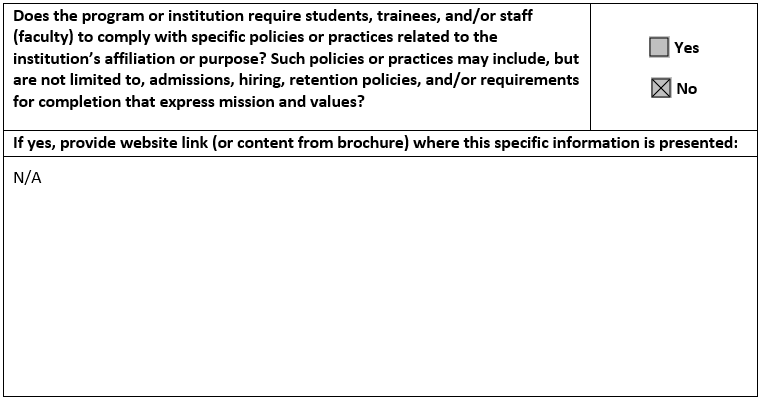
Internship program admissions
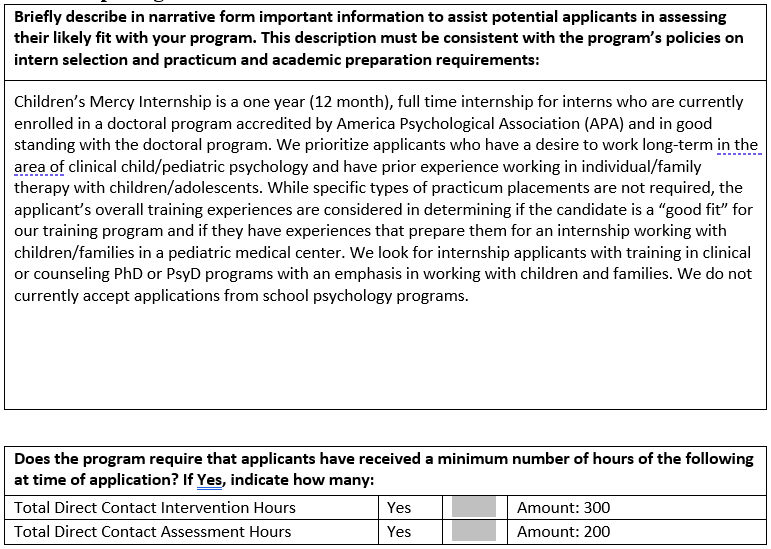
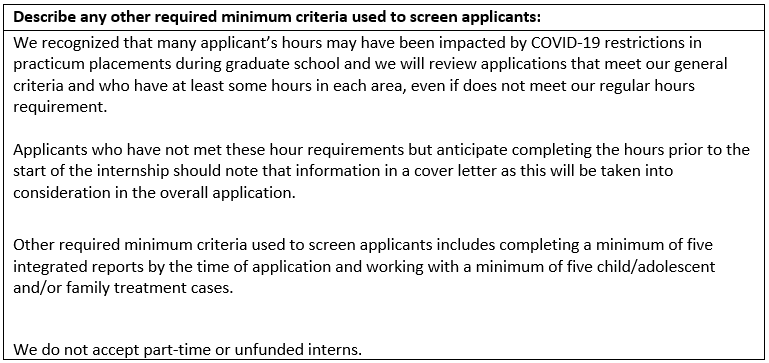
Financial and Other Benefit Support for Upcoming Training Year*
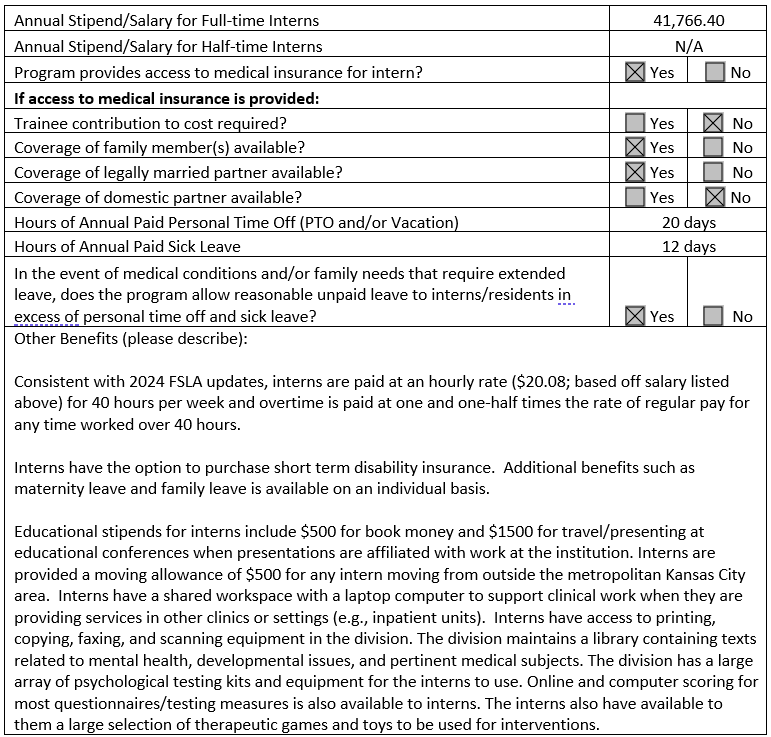
Note: Programs are not required by the Commission on Accreditation to provide all benefits listed in this table
Initial Post-Internship Positions
(Provide an Aggregated Tally for the Preceding 3 Cohorts)
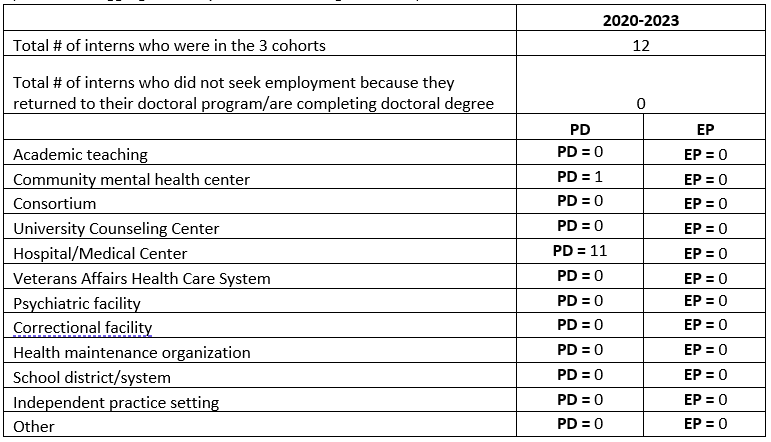
Note: “PD” = Post-doctoral residency position; “EP” = Employed Position. Each individual represented in this table should be counted only one time. For former trainees working in more than one setting, select the setting that represents their primary position.
1. What is the mailing address for the program?
Children's Mercy Kansas City
Division of Developmental and Behavioral Health
Section of Psychology
Attn: Anna Egan, Ph.D., ABPP
2401 Gillham Road Kansas City, Mo. 64108
(816) 234-3674
2. How many positions are available?
There are 4 doctoral internship positions available. Interns also have an opportunity to apply for at least three, 1-year postdoctoral clinical positions or two, 2-year postdoctoral clinical/research position to begin upon successful completion of the internship program.
3. How long is the program and what are the start and end dates?
The positions have a typical start date of the first August and a completion date towards the end of July the following year.
4. Do I need to have my dissertation completed and defended before I can start your program?
While we prefer that interns be in the defense stage of their dissertation when starting the internship, we realize that this is not always possible. We give preference to applicants who have shown significant progress towards dissertation completion.
5. Is it expensive to live in Kansas City?
Overall, living expenses in Kansas City are reasonable. Rent, the cost of owning a home, and the cost of food and fuel, all are generally lower than the national average, and lower than most other large municipalities.
Our internship site uses the AAPI Online Application Portal for submission of applications.
For more information about the development of the AAPI Online, including demonstrations and questions and answers, please visit the AAPIC Internship Matching Program website.
Application deadline
The application deadline for this Clinical Child/Pediatric Psychology Internship for is 11:59 p.m. on Nov. 1, 2023. All qualified applications will be reviewed with invitations for virtual interviews being issued by no later than Dec. 15, 2023. Virtual interviews will be held in early January of 2024 (anticipated dates of 1/8/24 and 1/9/24).
Recruitment guidelines
The internship program follows APPIC Guidelines in the recruitment of interns. Specifically, we:
-
Abide by the APPIC Match Policies.
-
Notify intern applicants that they can request a registration packet for the National Match System either through the National Matching Service's webpage or by calling them at (716) 282-4013.
-
Send a copy of the APPIC policies to applicants who request them.
-
Inform applicants who are excluded from consideration as early as possible in the process.
-
Refrain from offering an internship in any form before the beginning of selection day.
-
Certify, in writing, in no more than 72 hours following the end of selection day, all verbal agreements with applicants.
Psychology Training Model and Philosophy
The Children’s Mercy Training Program follows a "Scientist Practitioner" training model.
Message from the Directors of Clinical Training
This program is designed for the student who is interested in an intensive program in a fast-paced pediatric setting.
Educational Experiences
Learn more about the curriculum, including didactics, courses, and workshops.
Faculty and Trainees
Meet the team of faculty and trainees for the Child Psychology Training program.
Our Child Psychology Program leadership team
Anna Egan, PhD, ABPP
Program Director
aegan@cmh.edu
Ty Moore, MS, MBA
Program Coordinator
tmoore3@cmh.edu
